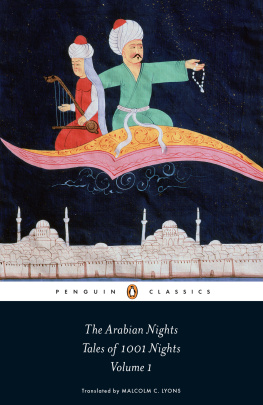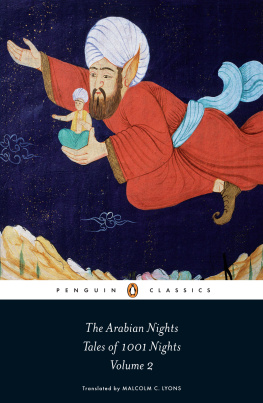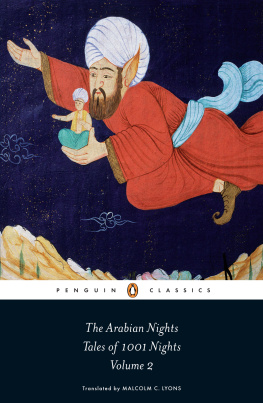Rafik Schami
Damascus Nights
1 How Salim the coachman arrived at his stories without ever leaving his seat
It's a strange story to say the least: Salim the coachman lost his voice. If it hadn't happened right before my very eyes, I would never have believed it. Everything started in 1959, in August, in the old quarter of Damascus. Even if I wanted to make up such an incredible story, Damascus would still be the best place to set it. Nowhere but Damascus could such a tale take place.
In those days, many strange people lived in Damascus. But what's so strange about that? They say when a city has been lived in continuously for over a thousand years, its citizens inherit the accumulated eccentricities of ages past. And Damascus can look back on several thousand years. So you can just imagine the kinds of unusual people running up and down its crooked streets and alleys. Old Salim the coachman was the most unusual of them all. He was short and slight, but his deep, warm voice easily made him seem a large man with broad shoulders, and he was a legend in his own lifetime, which doesn't mean that much in a city where legends and pistachio pastries are but two of a thousand and one delights.
What with all the coups during the fifties, it was not unheard of for residents of the old quarter to confuse the names of statesmen and politicians with those of actors and other celebrities. But no one ever made any mistake about Salim the coachman, who lived in the old town and who could tell such stories as would have his listeners laughing, or weeping, or both.
Among the unusual people running up and down the city, there were many who had a suitable saying ready for any occasion. Yet there was only one man in Damascus who could produce a story for everything whether you had cut your finger, caught cold, or fallen tragically in love. But how is it that this coachman Salim became the most famous storyteller in all Damascus? The answer to this question involves, as you may have guessed, another story.
In the 1930s, Salim worked as a coachman, driving between Damascus and Beirut. Back then the journey took two exhausting days. And they were two dangerous days as well, because the road wound through the rugged Great Horn Gorge, which was crawling with brigands who earned their daily bread waylaying travelers.
The coaches themselves differed little in appearance. They were constructed of iron, wood, and leather and carried four passengers. The competition for business was merciless; often it was the hardest fist that decided who would drive, and the passengers had no choice but to climb out of one carriage, pale with fright, and board the coach of the victor. Salim fought as well, but rarely with his fist: he used his cunning and his invincible tongue.
When the Depression came to Syria, fewer and fewer people could afford to travel, and good Salim had to devise some way to provide for his family he had a wife, a daughter, and a son to feed. What's more, robberies were on the rise, since many impoverished farmers and tradesmen were fleeing to the mountains to earn their bread as highwaymen. Salim would quietly promise his guests: "If you ride with me, you'll make it through without a scratch, and so will all your money and your bags." His good relations with the robbers enabled Salim to make such promises. Again and again he would drive from Damascus to Beirut and back unmolested. Whenever he entered a bandit's domain, he would leave a little wine by the side of the road, or else some tobacco but secretly, so the passengers didn't notice and the robbers would give him a friendly wave. He was never attacked. But after a while, the secret of his success trickled out, and all the other coachmen began to imitate him. They, too, left gifts by the roadside and were allowed to pass in peace. As Salim said, it got so that the brigands turned into fat, lazy collectors, utterly incapable of inspiring fear.
Thus his guarantee of a journey safe from robbers soon lost its unique appeal and Salim wondered desperately what to do. Then one day an old lady from Beirut came to his rescue. During the ride, he had recounted in great detail the adventures of a robber who had fallen in love with none other than the sultan's daughter Salim was personally acquainted with the man. When the coach reached Damascus, the old woman is said to have shouted, "May God bless your tongue, young man. Time flew much too quickly in your company." Salim called this woman his "good fairy" and from then on he promised his clients he would regale them with stories the whole way from Damascus to Beirut (or Beirut to Damascus) so that they wouldn't even notice the hardships of the journey. This was Salim's salvation, for no other coachman could tell tales as well as he.
But how did the old fox who could neither read nor write always come up with a fresh story? Quite simple! After his passengers had heard him tell a tale or two, he would ask them casually, "Now perhaps one of you would like to treat us to a story?" There was always someone, a man or a woman, who would answer, "I have a story that's absolutely unbelievable, but I swear to God it really happened." Or else: "Well, I'm not very good at telling stories, but a shepherd once told me one, and if you promise not to laugh at me I'll be glad to give it a try." Naturally Salim encouraged all his passengers to tell their stories. Then he would spice them up and pass them on to the next travelers. In this way he always had a fresh and inexhaustible supply.
The old coachman could charm his listeners for hours on end. He would tell of kings, fairies, and highwaymen he had experienced much in his long life. Whether the stories were happy or sad or full of suspense, his voice held everyone spellbound. Not only could it evoke sorrow, anger, and joy, it could even make you feel the wind, the sun, and the rain. Whenever Salim began to speak, he would soar inside his stories like a swallow. He would fly over mountains and valleys, and he knew every road, from our litde side street all the way to Peking, and back. Whenever he so desired, he would land on Mount Ararat nowhere else would do and smoke his waterpipe. And if the coachman didn't feel like flying, he would streak through the seven seas like a young dolphin. And because he was shortsighted, a buzzard accompanied Salim on all his travels and lent the old man his eyes.
Small and frail as he was in real life, in his stories he not only subdued giants who boasted glaring eyes and frightful moustaches, he also beat sharks into retreat and on almost every journey he would wrestle with a monster.
Salim's flying around the world was as familiar to us as the graceful gliding of the swallows across the blue Damascus sky. How often as a child did I, too, stand by the window and soar in my thoughts like a swift above our courtyard. Those flights hardly ever frightened me back then. But I would shiver along with everyone else at Salim's battles with sharks and other monsters of the deep.
At least once a month the neighbors asked the old coachman to tell the story about the Mexican fisherman, a story Salim especially enjoyed. It went something like this: Salim was swimming in the Gulf of Mexico, as peacefully and happily as a dolphin, when a giant evil octopus attacked a tiny fishing boat, causing it to capsize. The octopus started to wrap its tentacles around the fisherman, and he would have been squeezed to death if Salim hadn't rushed to his aid. The fisherman was so overjoyed he wept and swore by Holy Mother Mary that if his pregnant wife bore him a son he would name the boy Salim. Here Salim would always pause to check whether we were listening closely.
"And what if it had been a girl?" someone was bound to ask. The old coachman would smile contentedly, puff on his waterpipe and stroke his gray moustache. His answer was always the same: "Then he would have named her Salime, of course."











